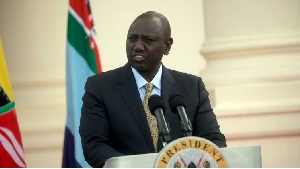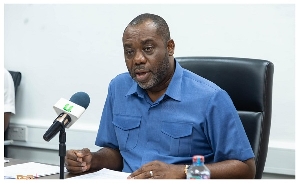Africa News of Saturday, 20 April 2024
Source: theeastafrican.co.ke
Israel-Iran war has Kenya in the spotlight, may be good for the Horn
The sharp escalation of the hostilities between Iran and Israel could have major geopolitical consequences for Eastern Africa, which is already feeling the economic heat from disruptions caused in the Red Sea by Iran-allied Houthi rebels in Yemen.
Kenya, in particular, could find itself in the global spotlight if Israel and Iran went to an all-out war, and Somalia, the newest member of the East African Community, could see its political fortunes altered.
Last Saturday, Iran launched an unexpectedly large barrage of more than 300 drones and missiles at Israel, in retaliation for Israel’s April 1 bombing of its diplomatic compound in Syria, which Tehran said killed seven of its military advisers, including three senior commanders.
Most of Iran’s missiles and drones were fended off with the help of Israel’s allies, including the US and UK, leading to speculation that they were meant as a “message,” not to do damage, because Tehran would have known that they would be intercepted.
Israel has said it will respond “at the time that we choose,” likely hitting targets far away inside Iran. Iran, too, has vowed a “massive and harsh response” should Israel attack. Tensions have ratcheted up between Israeli and Iran since the October 7, 2023 attack by Hamas, an ally of Iran, on Israel and the latter’s subsequent bombardment and ground attack of the Gaza Strip.
In Yemen, the Houthis, another Iran ally, in protest at Israel’s actions in Gaza, started attacking ships travelling on the critical Red Sea and Aden Sea routes in the Horn of Africa, which are crucial for global shipping. About 10 percent of global trade transits through the Suez Canal, 12 percent of global oil.
The attacks have forced international cargo ships to reroute, taking longer and more costly journeys around the Cape of Good Hope. The diversion adds about 3,500 nautical miles (6,482 kilometres), over $1 million in extra costs, and delays of up to two weeks for each affected ship.
East Africa is already feeling the pinch.
Israel does not share a border with Iran and Syria, which is a close-bosom ally of Tehran, and Lebanon, where the latter has entrenched affiliated military and political factions. A border away is Iraq, where Iran has sway. Across the Mediterranean, it faces regional power Turkey, which regards it with contempt.
Although it has normalised or established relations with Jordan, Egypt, Saudi Arabia, and the United Arab Emirates, these countries will hinder Iran, but won’t join Israel in the trenches against Iran, as the ruling houses there would imperil themselves if they did that.
While it can bomb Iran from the air and land because Iran is 75 times bigger in area and has a population eight times larger — and now likely also has nuclear weapons — Israel would need to get closer to complement its air war.
The most viable path would be to come through the Red Sea, into the Gulf of Aden around Yemen, through the north-western flank of the Indian Ocean, and into the Gulf of Oman.
Though the US has said it would not join Israel directly if it went to war with Iran, it would still offer it critical support. Principal among these could be its big Camp Lemonnier in Djibouti. France, too, would likely offer its Héron naval base in Djibouti. The problem there, though, is that the Djibouti and Yemen coasts are a spitting distance apart, at just 33km at the nearest point.
Via the Houthi allies, Iran could rain havoc on the Djiboutian bases, drawing both the Ismail Omar Guelleh regime and the Americans into a more direct role in the Yemen war that they have been avoiding.
The best opportunity to backstop Israel’s campaign would be through the joint Kenya-US anti-terrorism Camp Simba near Manda Bay in Lamu.
Manda Bay has become an important operational base for US-Africa Command forces in the region, and many bombings of Al Shabaab militants in Somalia in recent years have been coordinated out of there.
Kenya is expanding its base, and last year was reported to have asked the US to contribute significantly. The crisis in the Middle East might just loosen Washington’s purse strings.
It waits to be seen what hand Kenya would play if this eventuality arrived, but it could well give a wink and nod, then brave the geopolitical storms that might follow.
Kenya is home to Israel’s most important diplomatic post in the region, which has just moved into an imposing new building in Gigiri, the diplomatic suburb of Nairobi. It is also the longest continuously - existing Israeli mission in the sub-region, as Kenya never broke off diplomatic relations with Israel from the 1970s to 1980s, when almost all other African countries did.
Kenya would be no stranger to lending Israel a hand. In the July 1976 famed “Entebbe Raid” by Israeli special forces to free hostages flown to Uganda’s international airport aboard an Air France flight from Tel Aviv bound for Paris, which was hijacked by Palestinian militants, they made a refuelling stop for their aircraft at the Jomo Kenyatta International Airport.
Since President William Ruto came into office in 2022, Kenya’s foreign policy has pivoted more to the West. Its geopolitical premium has also risen considerably, helped in part by the fallout from Ethiopia’s Tigray war. It saw regional anchor Ethiopia politically emasculated, and its diplomatic relations souring with Western nations that slated its human rights abuses in Tigray during the conflict.
A conflict could also impact Somalia in several ways. After nearly a six-year lull, Somali pirates returned to the waters late last year. The International Maritime Bureau recently released its Q1 report on maritime piracy off the coast of Somalia, showing 33 recorded incidents of piracy and armed robbery against ships – 75 percent of current global piracy attacks.
An Indian Ocean swarming with warships would likely persuade the pirates — and the trawlers stealing Somalia’s fish — to stay home, making the waters safer for merchant shipping – if the Houthis are subdued.
Still-fragile Somalia could be bolstered as belligerents seek to use its ports and pay rent fees. But the end of piracy would not be universally welcome. Piracy, for all its criminality, is an important source of money for, especially, economically marginalised groups, and smaller investors.
On April 14, Somali pirates released a hijacked ship, MV Abdullah, and its crew of 23, and said they had been paid a $5 million ransom. It’s an embarrassing fact few want to admit, but such piracy loot travels far as interest-free capital in the region, going into real estate, and businesses like fuel stations, and bringing prosperity to some East African towns.
A wider conflict in the Middle East could also ease conflict in the Horn of Africa, as Saudi Arabia, the UAE, Turkey and Egypt, whose meddling is blamed for fuelling the conflicts in Somalia, Sudan, Ethiopia and the Sahel, would be distracted with a bigger crisis to worry about.
However, among other things, East and Southern Africa could end up in internet darkness, as most of the fibre optic cables from Europe, the Middle East and Asia to the region pass would be passing through a war zone. Besides the risk of damage from deep-sea bombs, it would be dangerous for repair crews if they were disrupted by non-war elements.
For Africa at large, it would be a reminder to act with urgency on some of the most desired pan-African projects that have remained unrealised – a railway and highway that connects the Indian Ocean from East Africa to the Atlantic Ocean in central Africa and West Africa coasts.
If chunks of the Indian Ocean rim were to be shut down by war, and this infrastructure had already been built, at least Eastern Africa would still eat and survive, with exports and imports from the Atlantic. Africa, though, has been notorious for wasting such crises.











